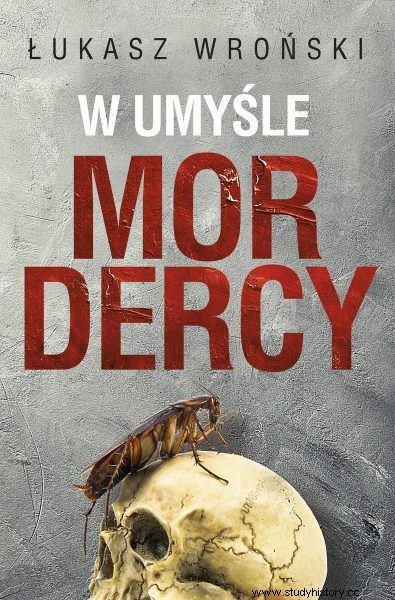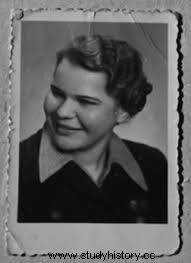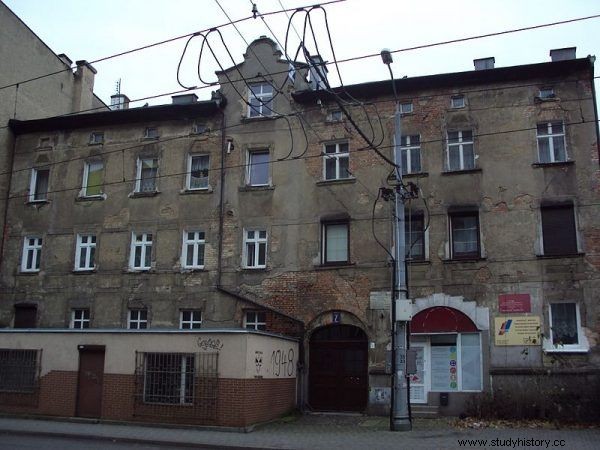Darkness ... Darkness can be so dense that sometimes it seems even tangible. We then feel how it surrounds us, how it takes on a material shape that plays on the invisible strings of our mind. Some call it the sixth sense of sudden dread, a warning of impending danger.
Sometimes this primal instinct that we have inherited from our animal ancestors can actually save us from extinction. Despite the passage of all these years, I still remember the moment when I felt it personally ...
Touching unknown
My name is Leszek Szuman and I came to Szczecin right after the war. Back then, this ruined city was a real cross-cultural melting pot, boiling with human characters, painfully marked by the war. Germans, Jews, Poles, all looking for their place in the new reality. In those hard times, when we defeated the occupier, the period of slowly rising from our knees has come.

The article is an excerpt from the book In the mind of a murderer , which was released in 2019 by the Skarpa Warszawska Publishing House
Szczecin had the infamous name of one of the most dangerous cities in the country, where murders and robberies were commonplace. People could not count on law enforcement and had to deal with themselves. Likewise, we had to be inventive in meeting current needs. We wandered through the ruins of the city like a flock of crows hovering over the carrion, picking up anything that might be useful for life.
During these trips, I reached the building of the then agricultural school at Słowackiego Street. The war interrupted its construction, and a pharmaceutical warehouse was arranged in its basement. In the basement I found bottles of medicine and piles of hangers lying around. Unfortunately, I didn't find anything I needed at that moment. I did not know that I would come back there in the future and miraculously avoid death.
A few years passed, I got married and became a father. My family was starting to grow and we needed clothes hangers. In those days, all such luxuries were a hard-to-find commodity. After a moment's thought, I remembered my find from the time when I was plundering the city's ruins. So I decided to go to the abandoned basement of the building at Słowackiego Street and check if the hangers were still there.
It was in the summer of 1952. When I entered the hall of the building, there were no signs of the unusual events that would be my part that afternoon.
Slowly shining a flashlight on my way, I headed towards the underground. I carefully passed the dirty corridors and piles of rubble. I was on the alert because in these difficult times I could always meet someone less friendly than me. I was already near the basement and started to descend when suddenly I felt something like a blow. A burning pain pierced my back.
Terrified, I stood motionless, staring into the darkness. I was alone. Invisible icy fingers gripped my throat, squeezing it painfully. A shiver ran through my entire body, hair bristling against it. Panic seized me. I knew that if I did not leave this place soon, I would never see the light of day again. This place will become my grave. The feeling that accompanied me was completely irrational, but it was almost tangible in nature. I was out of breath, I had to get out of there.
When I regained the use of my legs, I ran towards the exit. Coming to the surface, I fell on my knees gasping for breath, gasping greedily into my lungs. I knew I had just escaped the mortal danger. At the time, I did not know what was threatening me, but I was convinced that the threat was real. Now, as I write these words, capturing my memories, I already know what lurked in the dark then and who was responsible for my overwhelming fear. The evil that this man did was so horrible that it took a tangible form that day, which I am sure I could sense.
September 11, 1952
The policemen banging on the door of the tenement house at 7 Wilsona Street lost their patience and broke down the door to the apartment. Upon entering, they felt a musty stench in the air. A faint light streamed through the curtains hanging in the windows, barely illuminating the room. There was no one in the apartment.
An hour earlier, the militia received a report from a certain Józef Jarosz, who, after returning home, was concerned about the absence of his wife. There was only a neighbor in his apartment who looked after the Jarosz child. The woman claimed that she heard the baby crying incessantly and came to see what was happening. The front door was open so she stepped inside. The baby's mother was gone. She decided to watch the baby and wait for him to come back, but Irena Jarosz disappeared.
Upset, Józef began to question his neighbors about his wife. Such a disappearance was completely unlike her, especially with a tiny baby in the house. Józef walked around the tenement house in search of Irena, but it did not bring any results. When he returned to his apartment, he noticed that the duvet, blanket, sheet, suit and watch were also missing from the house. The man was not going to wait any longer and called the police.

Irena Jarosz, the only confirmed
victim of the "butcher from Niebuszewo".
Before the security services arrived, Józef decided to check one more place: the apartment of his strange neighbor Józef Cyppek . He had a disturbing feeling that it might have something to do with Irene's disappearance. The man did not open him when he was looking for a wife the first time, so he decided to look inside his apartment through the window. The restaurant was on the ground floor, so there was no problem with that.
As he climbed onto the windowsill on his elbows, he managed to see the inside of the room. Despite the dim light there, he recognized the duvet on the floor that had been stolen from his apartment.
The militia officers arrived at the scene listened to the shaken man and knocked on Cyppek's door. When he did not open it, they decided to wait for the man. When no one came after thirty minutes, they decided to force their entry into the room.
After crossing the threshold of the apartment, they began to look around at individual rooms. At the same moment, the waiting officer saw a man walking towards him in the corridor.
- That's him! Joseph shouted, pointing his finger at the stranger. - It's Cyppek!
The man stopped in mid-step, and Jarosz fell to him, grabbing his coat.
- What did you do with my wife, motherfucker ?! He shouted and began tugging at his clothes. - Where is she?
The policeman ran to the men and began to separate them.
- Don't worry here! He roared, grabbing both of them by the shoulders. It was growing, and they felt its grip painfully against them. At the same time, a scream came from inside the room.
- Wiesiek, come here quickly!
The policeman loosened his grip a little and turned at his name.
In the threshold of the wide open door stood a policeman who was pale as a wall. He looked at his friend. There was horror mixed with disgust on his face. N hesitated, began to vomit onto the floor as a third officer appeared behind him.
- Hold that bastard! He pointed to Cyppek's finger. - He's a murderer.
From the work notebook:
After breaking down the door to the apartment of citizen Józef Cyppek, we entered the room. From the entrance we felt a strange sweet and putrid smell in the air. During the further penetration of the living quarters, we came across a body that probably belonged to the wanted Irena Jarosz. In the kitchen, on the floor was a torso with its head, arms, and legs severed. The limbs lay beside him. Next to it was a bucket with guts most likely belonging to the victim. In the kitchen countertop, we revealed plates with a liver and a human heart. There was a grinder next to it, through which someone had passed the meat. Next to it was a plate of tomato salad. The head was not found.
The Butcher from Niebuszewo
Józef Cyppek was a mysterious figure. He came from Opole, his mother was Polish and his father was German. Cyppek himself always considered himself a German, therefore he was fluent in the language. When he graduated from primary school, he became a locksmith. Despite his short stature, he was well built. He was wounded during the First World War and his leg was amputated at knee level. He was awarded two medals. He joined the Communist Party during treatment and was eventually accused of subversive activity.
In 1919 he got a job on the railroad. A year later he married a Polish woman with whom he had two sons. His spouse, however, died in 1941 during an Allied bombing. Two years later Cyppek became involved with Margarita, who was considered a woman of easy morals . After the end of the war, they both came to Szczecin.
In Szczecin, Cyppek started working as a locksmith in a tram depot. His wife was a pimper and was eventually arrested. While she was in prison, Cyppek kept in touch with many women. The neighbors considered him a drunk who had libations in his apartment.
Cyppek knew many Germans, including a butcher, a young employee of a meat factory and Hans - the owner of a stall at the city market.
During the interrogation, Józef Cyppek confessed to committing the murder. He claimed that he had liked Irena for a long time. On the critical day, she came to borrow some flour from him. Cyppek let her into the apartment and offered sex there. When the woman refused, he attempted to rape her. During the struggle, he hit her on the head with a hammer. The victim's body was dismembered because he wanted to get rid of it and bury it in the cemetery. Out of laziness, he decided to drown them in the Rusałka pond in a nearby park. He only managed to do this with the missing head.

Tenement house at ul. Niemierzyńska 7 in Szczecin, where Józef Cyppek lived
The forensic doctor stated that the body had been expertly dismembered as if the perpetrator had done it before. This information was puzzling, because an anatomy textbook and girls' clothes of unknown origin were found in the perpetrator's apartment. It was suspected that there could be more of Cyppek's victims.
The police decided to drain the water from the Rusałka pond. When the water subsided, the policemen discovered something that exceeded their wildest expectations. The white bones of skulls protruding from the bottom of the pond shone through the thickets and mud. The militia started securing the find. It turned out that a total of several dozen human skulls, mostly belonging to children, were revealed.
Cyppek did not admit to other crimes, but during the interrogation he began to change his mind. He confusedly answered questions, once confirming the investigators' reports, only to contradict them in a moment. Investigators did not know if they were dealing with a real monster or just a rapist who was ineptly trying to get rid of the body of his would-be victim.
Information from the investigation began to leak to the public. People in town gossiped about the details of the horrific crime. Cyppek was supposed to murder children in the basement of the later agricultural academy and transform them into edible preserves. According to city rumors, he was in league with the Gwardia cinema ticket agent, to which he regularly attended. When one of the children was missing a ticket, she was to send them to Cyppek, who allegedly added the missing amount to them. Cyppek murdered children and sold their meat at his friend's stall. Regardless of the truth of these revelations, people were terrified. The city began to boil.
The authorities, seeing that the aggressive mood in the city was starting to gain strength, began to fear riots. Since the killer considered himself a German, it was suspected that the angry mob might be lynching citizens of the city who were of that origin. It wasn't long since the end of the war, and the people continued to hate the former occupiers so earnestly. It was decided to close the case and classify its results.
Two days after Cyppek's arrest, an indictment was sent to the Szczecin court in which the charges related only to the murder of Irena Jarosz. There was no information in it about human flesh being passed through the mincer found at the crime scene.
The trial of Józef Cyppek began and ended six days after his arrest. There was only a brief mention of this in the newspapers. Two months later, according to the court's verdict, Cyppek was hanged.
Epilogue
Despite the passage of time, the legend of the Butcher lives on in the streets of Szczecin. Both the few living witnesses of those days and those who appeared after them added their own stories to it:about nails found in meat bought in the Szczecin market place, about the fact that Cyppek was a former SS man and therefore had contacts that allowed him to to operate for so long under the watchful eye of the authorities. It is hard to distinguish truth from fiction, and the legend is doing well, just like the old tenement houses from Niebuszewo, which, despite the passage of time, look almost the same as on the day this macabre crime was revealed.

The article is an excerpt from the book In the mind of a murderer , which was released in 2019 by the Skarpa Warszawska Publishing House
Similar stories live among us, passed down from generation to generation, and eventually become a myth. Even Leszek Szuman wrote about the murderer from Niebuszewo in his book describing the mysteries of the extrasensory world. He supposedly had a gut feeling to miraculously escape death at his hands.
Eventually, the legend begins to be treated as an invention, even though its source is deadly real. People forget about its origins and the victims behind it. They treat it as a kind of "ghost story" which, by making their hearts beat faster, is supposed to keep them entertained. It is like that all over the world. In London, tours wander the streets where Jack the Ripper hunted, and in San Francisco, they still try to guess who the Zodiac really was. Summa summarum practically every major city has its Butcher.
The article is an excerpt from the book In the mind of a murderer , which was published in 2019 by the Skarpa Warszawska Publishing House
